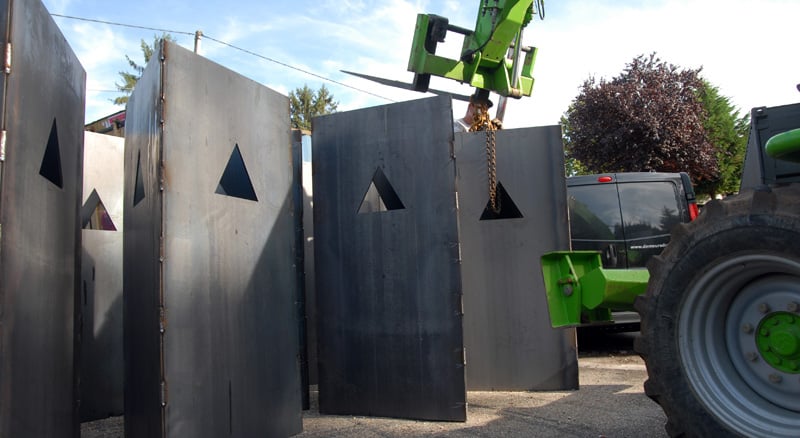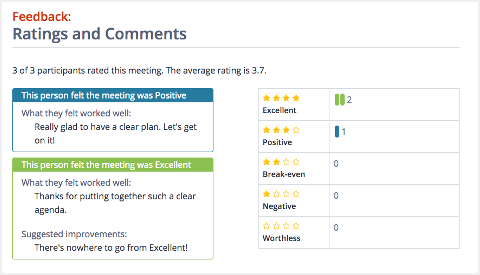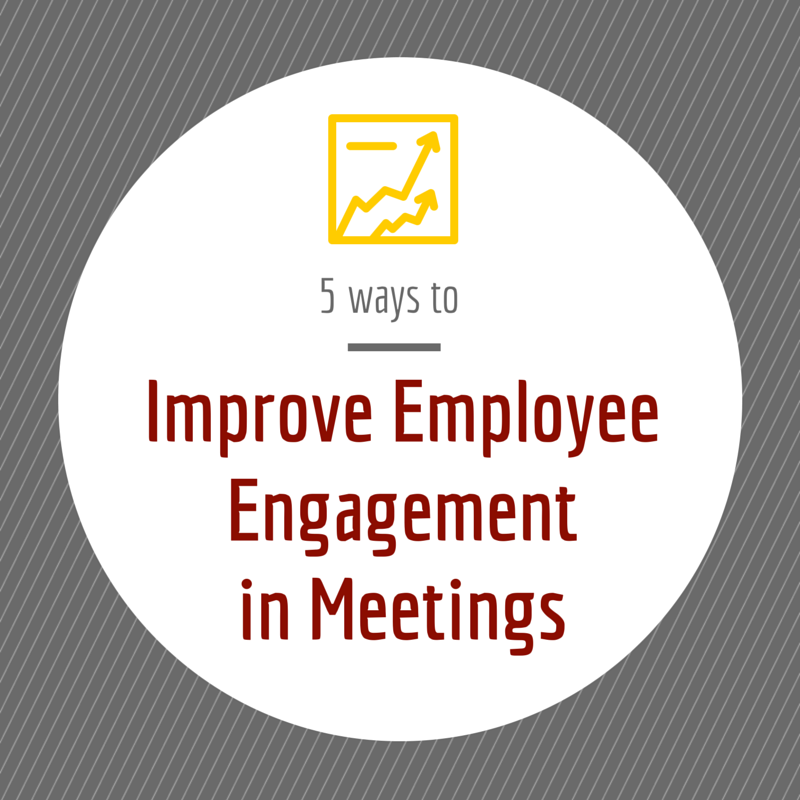2 Fast and Easy Ways to Get Meeting Feedback
We all sit in meetings. But how often do we examine how well those meetings go? In this post, we’ll walk through two simple ways to assess meeting effectiveness, so you’ll know how to make your meetings better.
Before we dive into the specifics, let’s cover a few general tips:
- Let people know you’ll be asking for feedback
The easiest way to do this is to include “Feedback” in the agenda as part of your last item. When you don’t let people know you’ll be asking for feedback in advance, they won’t have a chance to gather their thoughts and may resent the extra time – not the best situation for getting useful comments.Side note on this one: After every Lucid Meeting, people can provide feedback using an online survey, or they can skip it. If the meeting leader asks the group to fill out the survey, most people provide feedback. On the other hand, if the meeting leader says nothing and the survey just appears automatically, most people skip it.
- Keep it short
Both methods described here can get meeting feedback in 5 minutes or less, although your group can take longer if you all find the conversation productive. - Ask for examples of ways to improve, not about problems.
We’re all naturally good at pointing out flaws, even when the supposed flaw can’t be fixed or didn’t really matter. You don’t want to ask questions that encourage a negative rant at the end of a meeting.Use “what can we improve?” instead “what went wrong?” By asking how to improve, you focus the group on improvement and solutions rather than criticism.
1. Typical Working Meetings – ROTI

The kind of meeting you’re measuring dictates the best way to measure it. For collaborative team meetings, status check-ins, and other “getting normal work done” meetings, we recommend ROTI – Return on Time Invested.
The ROTI meeting measurement comes from the Agile methodology. Simply put, the idea is to use a simple numerical scale to measure each meeting participant’s ROI for the meeting, where the “investment” is time spent. So how does this work?
At the end of each meeting, ask your participants to rate the meeting on a scale from ZERO to FOUR. The ratings mean:
- 0 – For this team member, the meeting was a complete waste of time — no value was received. In other words, the ROI is literally zero.
- 1 – More time was wasted than value was derived. So for instance, while 30% of the meeting time was useful, 70% was not.
- 2 – An even split (50/50) of value and time spent. This is sometimes considered an “average” meeting, in that you may spend half the time on things that aren’t directly useful — but overall, the meeting was a wash.
- 3 – More value derived than time spent. This is above average, and one way to think of it is, “If I spent the same amount of time on my own trying to seek out the information and decisions I gained in the meeting, could I have done it?” At 3 and above, the answer is no. This is the sweet spot for high-functioning collaborative teams.
- 4 – Very strong value for time spent. The meeting was crucial to moving forward, so the investment of time was clearly worth it.
Some teams prefer a 1-5 scale; we recommend 0-4 because “0” denotes failure pretty obviously. If you’re meeting in person, the meeting leader may ask for people to hold up hands showing a number of fingers to rate the meeting (or if you use the 0-4 scale, potentially a closed fist for zero!), then write the scores on a whiteboard. If you’re meeting online, you can capture these ratings in chat or use a poll to capture this feedback.
Tip: Once you have these ratings, you need to ask the followup question. That question is, “What would it take for you to improve your rating by one point?” The answer to that question will help you improve your next meeting.
2. Special Working Sessions – Plus/Delta

For project kickoff meetings, training sessions, workshops, webinars, and the like, we recommend the Plus/Delta exercise. Derived from Lean Six Sigma, Plus/Delta is a structured way to determine what is going well and what should change.
To run a Plus/Delta exercise, first ask team members to think of some positive (“plus”) aspects of your meeting. These can really be anything, for instance:
- Everybody showed up on time.
- The presentation about engineering progress was useful.
- I could actually hear everybody on the phone.
- I’m glad we reached a go/no go decision for the next phase of the project.
The “pluses” are handy — they tell you what’s going right. You might already know that, but having evidence from your team that certain things are working well is a strong indicator that you should continue doing those things. Discussing these positive points also gives the team social permission to start talking about what comes next.
Often the most actionable team input comes from the “deltas” — those things that should change (“delta” is a Greek letter shaped like a triangle, often used in math and science to denote “change”). By starting with positives, you can gently move into what should change, for instance:
- Some people spent too much time on stuff that they could’ve talked about one-on-one.
- We didn’t reach a decision about who owned a few action items.
- We were missing some people — now who’s going to go fill them in on what we decided?
- I could’ve used more prep time with the documents beforehand, so I didn’t have to read them during the meeting. That felt like a waste of time.
Once you have collected both “pluses” and “deltas,” you have a clear sense of how to improve your next meeting (and what not to change, because it’s already working). Your mission is to use the deltas to improve your meetings, and continue to measure in the future.
For a good example of Plus/Delta in practice check out this overview from Ernie Arboles, and be sure to check out the WHO/WHAT/WHEN section.
One more easy way to collect feedback is to use Lucid Meetings – the tools are built in!

Share with the Community: How do you get good feedback?
Do you regularly ask for feedback on your meetings? If so, what methods and questions have you found to be especially useful? Share your tips with everyone in the comments!
Images used under Creative Commons license: time is money by Tim; delta sculptures by Thierry Ehrmann.



